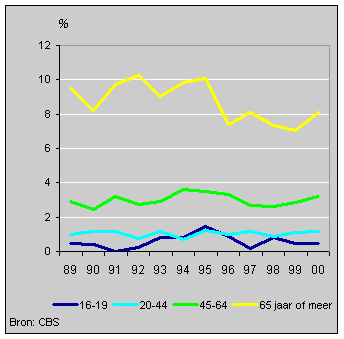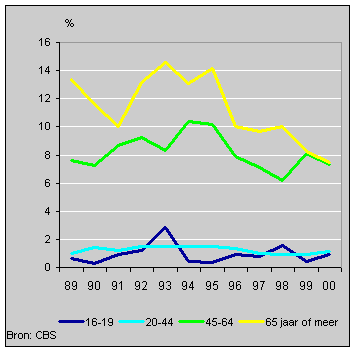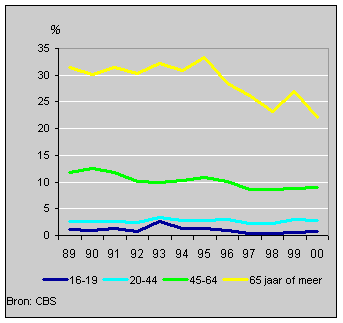Fewer ailments for the elderly

Age is a heavy burden, or so the saying goes. Statistics Netherlands’ figures partly confirm this picture. The proportion of people who perceive their health as less than ‘good’ has risen slightly in the last fifteen years. In the mid and late eighties 17 to 18 percent of the population described their health in these terms; by 2000 this had risen to twenty percent.
Increase caused by ageing population
If the ageing of the population is taken into account, however, the increase disappears. The less positive description of people’s own health turns out to be fairly constant at 18 percent.
More elderly people, but not more ailments
Remarkably enough the ageing population is not accompanied by more impairments. Although there are more old people, they report fewer impairments of hearing, sight and movement.
Hearing impairments
Serious hearing impairments were reported by a stable three percent of the population aged 16 and older in the years 1989-2000. These people are unable or hardly able to follow a conversation with others, even with a hearing aid.
Hearing impairments by age

Fewer hearing problems for over-65s
The percentage of people aged 65 and older with hearing problems has decreased in recent years. This is partly because more (and better quality) hearing aids are used. The decrease in problems among the over-65s means that the ageing of the population is not accompanied by more hearing impairments.
Impaired sight
In the first half of the nineties the proportion of people with seriously impaired sight, even with glasses or contact lenses, rose from five to six percent. It subsequently fell to four percent in 2000. For sight impairment, too, the decrease is mainly reported for the over-65s.
Sight impairments by age

Impaired movement
Impairments in people’s ability to move around fell from ten percent of the population in 1989 to just over seven percent in 2000. Remarkably, the decrease was completely accounted for by the over-65s age group. The proportion of the other age groups is fairly constant.
Impaired movement by age

Ferdy Otten and Frans Frenken